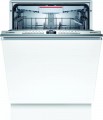Type of instalation
—
Fully integrated -in. Fully integrated dishwashers are devices in which, with the door closed, the control panel is hidden inside. The controls are usually mounted on the top end of the door for this. The main advantage of such devices is a neat appearance: in the closed position, only a solid door is outside (on which sometimes there is even no handle, see “Opening without a handle”). Another thing is that the control panel is less prone to contamination. At the same time, you inevitably have to open the machine to access it; this can create inconvenience if the programme needs to be changed right in the process of work. The indicators are also hidden inside; this disadvantage can be partly corrected by the “beam on the floor” system (see the relevant paragraph), but it is not available in all such models.
—
With an open control panel. Dishwashers in which the control panel is located outside, above the door. Thanks to this, the user has constant access to the controls, and to the display and other indicators; in this sense, such units are noticeably more convenient than fully integrated ones. Their disadvantage is primarily related to the design: the control panel will not fit into every kitchen interior, especially if the owner of the kitchen appreciates minimalism and the absence of unnecessary details on the kitchen set.
Number of place settings
The maximum number of dish sets that can be loaded into the dishwasher at one time. A set is considered a set of dishes for one person: four plates (for the first course, for the second course, salad, bread), a plate for dessert, a cup, a spoon and a fork.
The large capacity allows you to wash numerous dishes in the device at one time without starting the washing programme again. At the same time, excess capacity is just as undesirable as insufficient. Firstly,
a capacious operating chamber affects the dimensions of the entire device. Secondly, such units consume more water. Thirdly, if there is not much dirty dishes, you either have to wait until it accumulates, or start an underloaded device, wasting water and detergents. Therefore, when choosing according to this indicator, real needs must be taken into account and not chase after the maximum capacity.
Water consumption
The amount of water used by the dishwasher in one washing cycle. Usually, it is indicated for a standard cycle — at full load, without pre-rinsing, etc. Accordingly, in special modes, the consumption may differ from the indicated one.
The lower the consumption — it better; this is especially true for those who consume water by metres or who have a limited supply of water (for example, it is drawn from a well with a low productivity). On the other hand, a reduction in consumption can have a negative effect on the quality of the wash. So, choosing an
economical dishwasher, you should pay attention to the washing class (see below). In addition, only models of the same capacity can be compared in terms of consumption — after all, the more dishes, the more water is required to wash them.
Energy class (new)
This parameter characterizes the efficiency of electricity consumption by a dishwasher. Classes are denotet in Latin letters from A to G, in ascending order of energy consumption. Actually, more energy-efficient models have not been added to the A class, which eventually received the marking A +, A ++, A +++. Further development of technology has made it possible to go even further, and in order not to produce pluses in energy efficiency marking, manufacturers returned to the previous indices from G to A in March 2021, where
А is the most energy efficient dishwasher. But also
class B,
C,
D and even
E are also quite economical (no worse than A +++). Accordingly, the 2021 models will have modern markings, while older models will be marked in the same way.
Noise level
The approximate noise level produced by the dishwasher during operation. In modern models, this parameter can range from 37 – 39 dB (muffled human voice) to 59 – 60 dB (loud conversation); more detailed decoding of what sound corresponds to a particular number of decibels can be found in special tables. Anyway, the
low noise level contributes to the comfortable use of the device. It is especially important if the dishwasher is to be used at night (for example, if there are reduced electricity rates at night).
Noise class
Allows people to decode the values of the noise level in decibels. It is marked in Latin letters like other classes, where A is the quietest class of dishwashers.
End-of-cycle signal
Sound signal, indicating the end of the dishwasher operating. Many dishwashers work quietly and without a special signal, it can be difficult to determine whether the programme has ended.
Child lock
A protective system designed for those cases when there are small children in the house. To prevent a curious child from injuring himself and ruining the dishwasher, various locks can be provided in the design — usually for the door, sometimes also for the control panel.
The child lock function turns off in a way that is easily accessible to an adult but not accessible to a child.
Dimensions (HxWxD)
Dishwasher dimensions in height, width and depth. An obvious parameter; we only note that when determining the amount of space required for integration, the width and height of the unit are important.
In most modern built-in dishwashers, the width corresponds to one of the standard values (about a centimeter):
45 cm for narrow models,
60 cm for standard ones and
55 cm as a compromise between these dimensions. As for the second dimension, dishwashers with a height of up to 60 cm inclusive are usually classified as
compact, they require installation at a certain height above the floor.
Full-size models, with a height of more than 60 cm, can also be installed at floor level.

